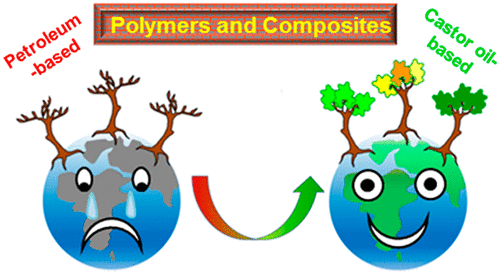当前位置:
X-MOL 学术
›
Biomacromolecules
›
论文详情
Our official English website, www.x-mol.net, welcomes your feedback! (Note: you will need to create a separate account there.)
Polymers and Composites Derived from Castor Oil as Sustainable Materials and Degradable Biomaterials: Current Status and Emerging Trends
Biomacromolecules ( IF 6.2 ) Pub Date : 2020-11-23 , DOI: 10.1021/acs.biomac.0c01291 Indranil Chakraborty 1 , Kaushik Chatterjee 1
Biomacromolecules ( IF 6.2 ) Pub Date : 2020-11-23 , DOI: 10.1021/acs.biomac.0c01291 Indranil Chakraborty 1 , Kaushik Chatterjee 1
Affiliation

|
Recent years have seen rapid growth in utilizing vegetable oils to derive a wide variety of polymers to replace petroleum-based polymers for minimizing environmental impact. Nonedible castor oil (CO) can be extracted from castor plants that grow easily, even in an arid land. CO is a promising source for developing several polymers such as polyurethanes, polyesters, polyamides, and epoxy-polymers. Several synthesis routes have been developed, and distinct properties of polymers have been studied for industrial applications. Furthermore, fillers and fibers, including nanomaterials, have been incorporated in these polymers for enhancing their physical, thermal, and mechanical properties. This review highlights the development of CO-based polymers and their composites with attractive properties for industrial and biomedical applications. Recent advancements in CO-based polymers and their composites are presented along with a discussion on future opportunities for further developments in diverse applications.
中文翻译:

蓖麻油衍生的聚合物和复合材料作为可持续材料和可降解生物材料:现状和新兴趋势
近年来,利用植物油来衍生各种聚合物来代替石油基聚合物以使环境影响最小化的发展迅速。蓖麻油(CO)可以从即使在干旱地区也容易生长的蓖麻植物中提取。CO是开发多种聚合物(例如聚氨酯,聚酯,聚酰胺和环氧聚合物)的有希望的来源。已经开发了几种合成路线,并且已经研究了聚合物的不同性质以用于工业应用。此外,已将包括纳米材料的填料和纤维掺入这些聚合物中以增强其物理,热和机械性能。这篇综述着重介绍了具有吸引力的CO基聚合物及其复合材料在工业和生物医学应用中的发展。
更新日期:2020-12-14
中文翻译:

蓖麻油衍生的聚合物和复合材料作为可持续材料和可降解生物材料:现状和新兴趋势
近年来,利用植物油来衍生各种聚合物来代替石油基聚合物以使环境影响最小化的发展迅速。蓖麻油(CO)可以从即使在干旱地区也容易生长的蓖麻植物中提取。CO是开发多种聚合物(例如聚氨酯,聚酯,聚酰胺和环氧聚合物)的有希望的来源。已经开发了几种合成路线,并且已经研究了聚合物的不同性质以用于工业应用。此外,已将包括纳米材料的填料和纤维掺入这些聚合物中以增强其物理,热和机械性能。这篇综述着重介绍了具有吸引力的CO基聚合物及其复合材料在工业和生物医学应用中的发展。



























 京公网安备 11010802027423号
京公网安备 11010802027423号